Denial Code CO 59: Everything You Need to Know
For billing teams, knowing how to prevent and resolve CO 59 denials is key to effective denial management and maintaining smooth revenue cycle management. So let’s jump into it!

Did you know that nearly 15% of all claims submitted to payers for reimbursement got denied? Each denial represents delayed revenue, added administrative work, frustrated providers and patients.
While there are dozens of denial codes that explain why payers reject claims, one common denial CO is 59.
This code means that multiple billed services were considered not separately payable, which is a frequent issue tied to bundling rules and documentation gaps. For billing teams, knowing how to prevent and resolve CO 59 denials is key to effective denial management and maintaining smooth revenue cycle management.
So let’s jump into it!
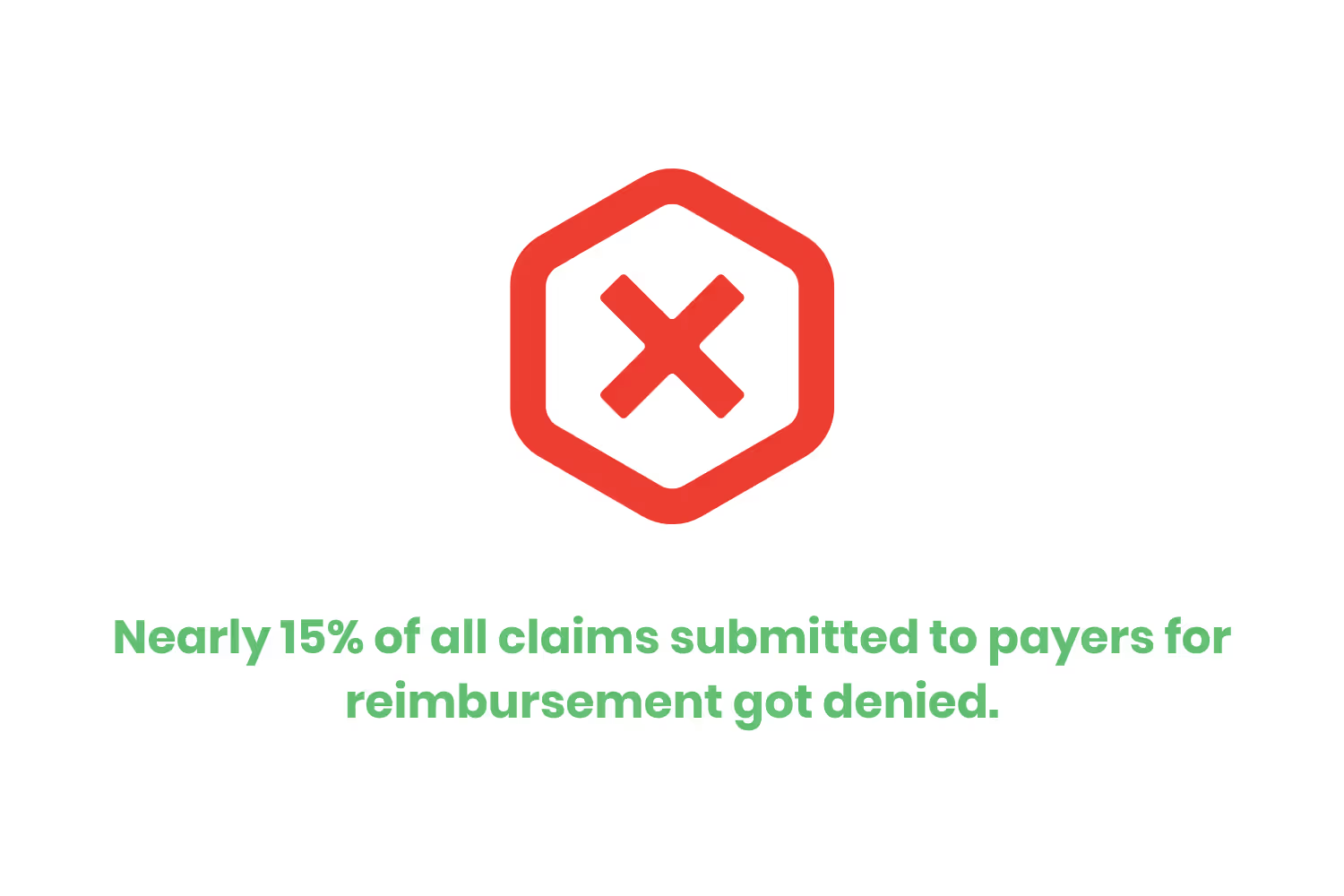
What is a Denial Code in Medical Billing?
Before we can go into what exactly denial code CO 59 means, let’s lay the groundwork for what a denial code actually means.
Definition of Denial Codes
A denial code is a message sent by insurance providers that explains why a claim has not been paid. Each reason code must be carefully reviewed by the billing staff to understand why the claim is denied.
These denial codes are essential for healthcare billing teams because they identify the exact issue preventing payment. Understanding these codes helps providers and billing staff correct errors, appeal denials when appropriate, and improve the overall billing process.
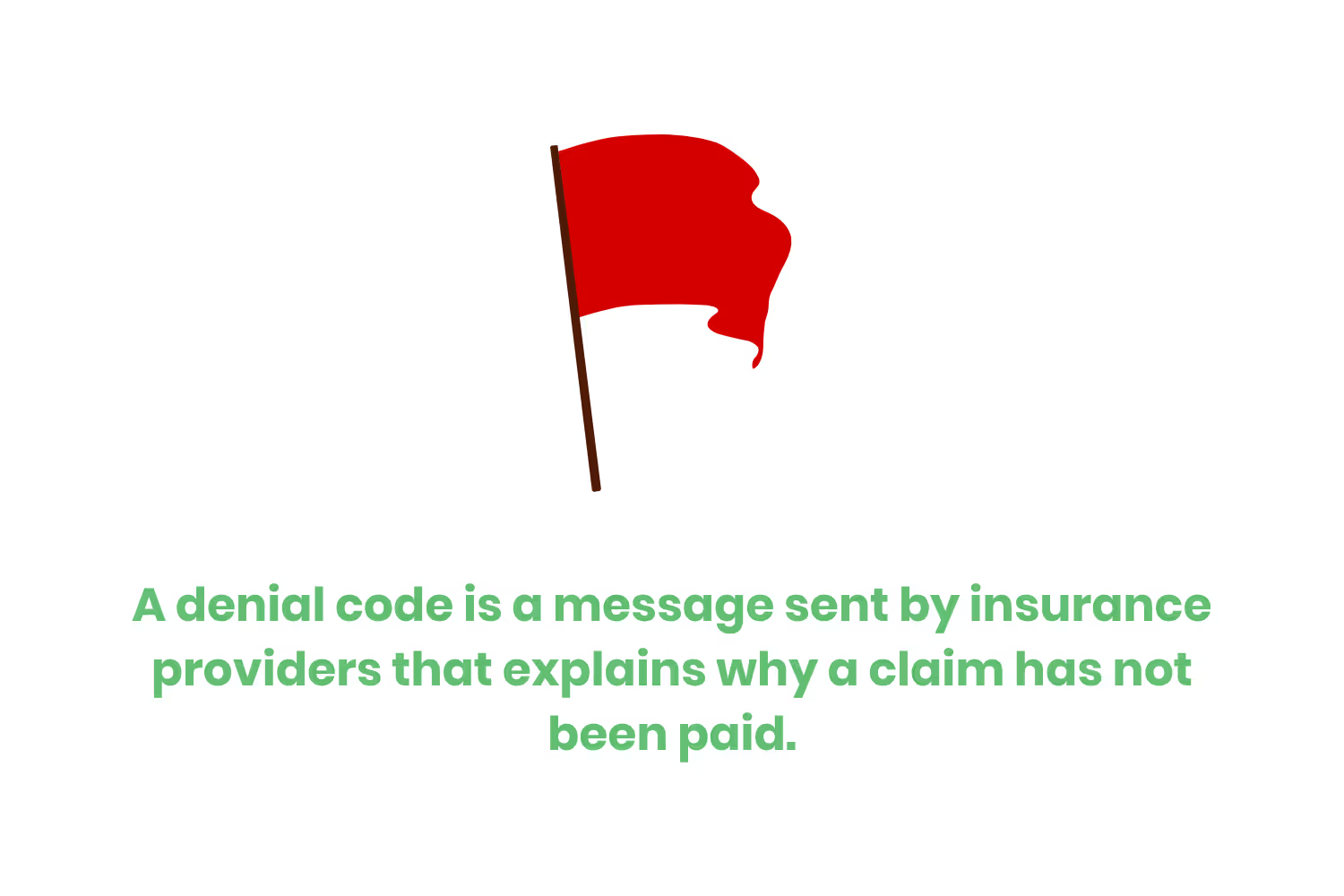
Categories of Denial Codes
There are two different types of denial codes that an insurance provider can receive:a CO and PR denial codes.
A CO denial code means that there is a contractual obligation between the patient and the insurance company. This code means that the patient is not responsible for the denied amount.
Now there’s a PR denial code, which means that it is the patient’s responsibility to pay for either partially or the entirety of the bill.
What Does Denial Code CO 59 Mean?
Denial Code CO 59 means that the claim for certain services will not be paid separately. In other words, this is when the claim is denied because the insurer believes the services should be bundled.
I know this can sound more complicated than it is, so let’s walk through a real-world example. Imagine a patient needs an abdominal ultrasound and receives both a complete scan and a limited scan on the same day. Since the complete scan already covers everything, the insurance company may deny the limited scan with CO 59, considering it part of the full exam.
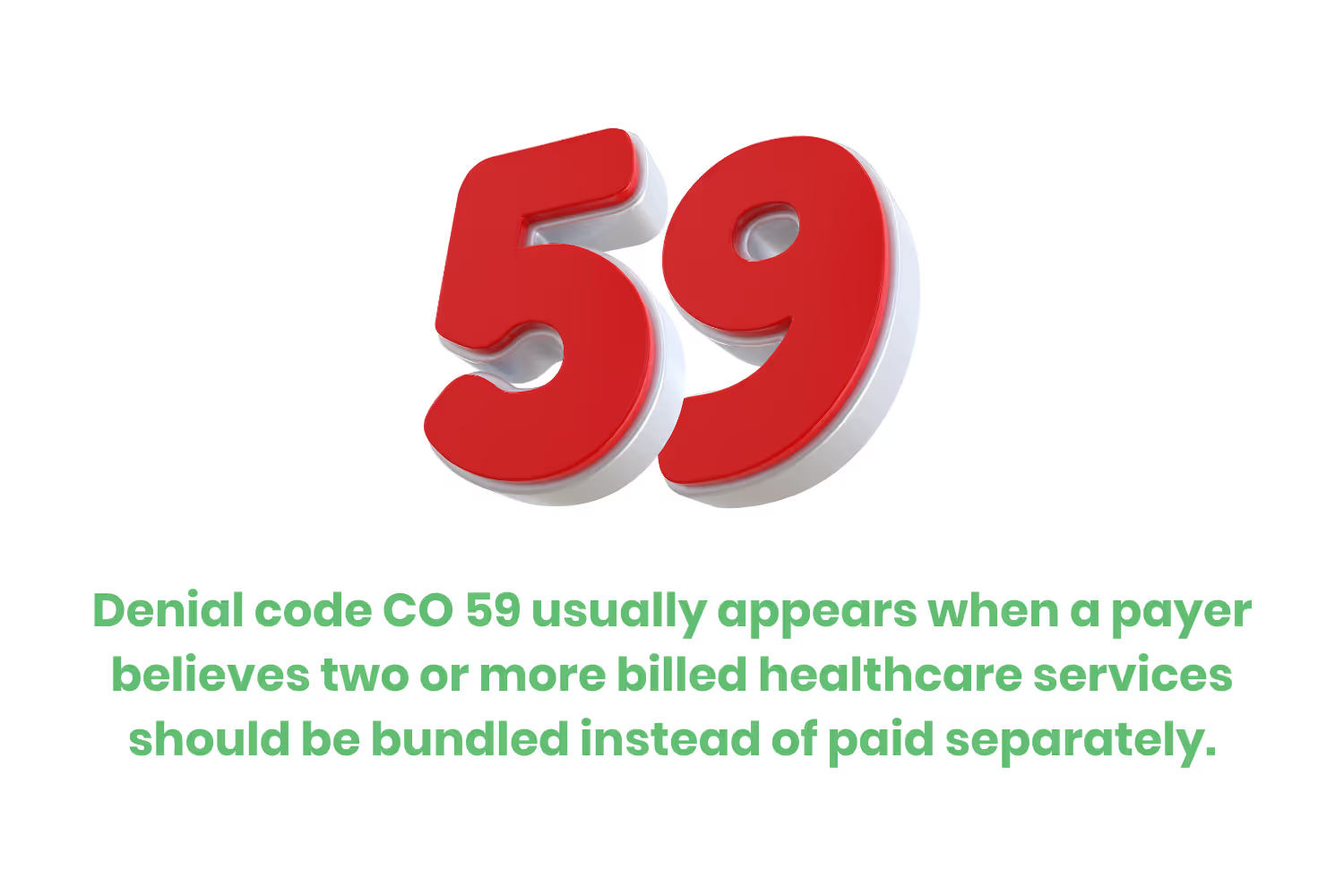
Common Reasons for Denial Code CO 59
Denial code CO 59 usually appears when a payer believes two or more billed healthcare services should be bundled instead of paid separately.
Another reason payers issue CO 59 is when they believe the claim includes duplicate billing for the same service. The most common reasons for CO 59 are unbundling errors and documentation gaps.
Unbundling Error
Unbundling happens when services that belong under one code are billed as separate charges, using the wrong modifier or code, which can lead to coding errors. Sometimes denials also happen when the correct modifier isn’t applied to distinguish services that were legitimately separate.
For example, if a surgeon bills for a medical procedure and then also bills separately for suturing, the payer will deny that extra line because suturing is already included in the surgery code.
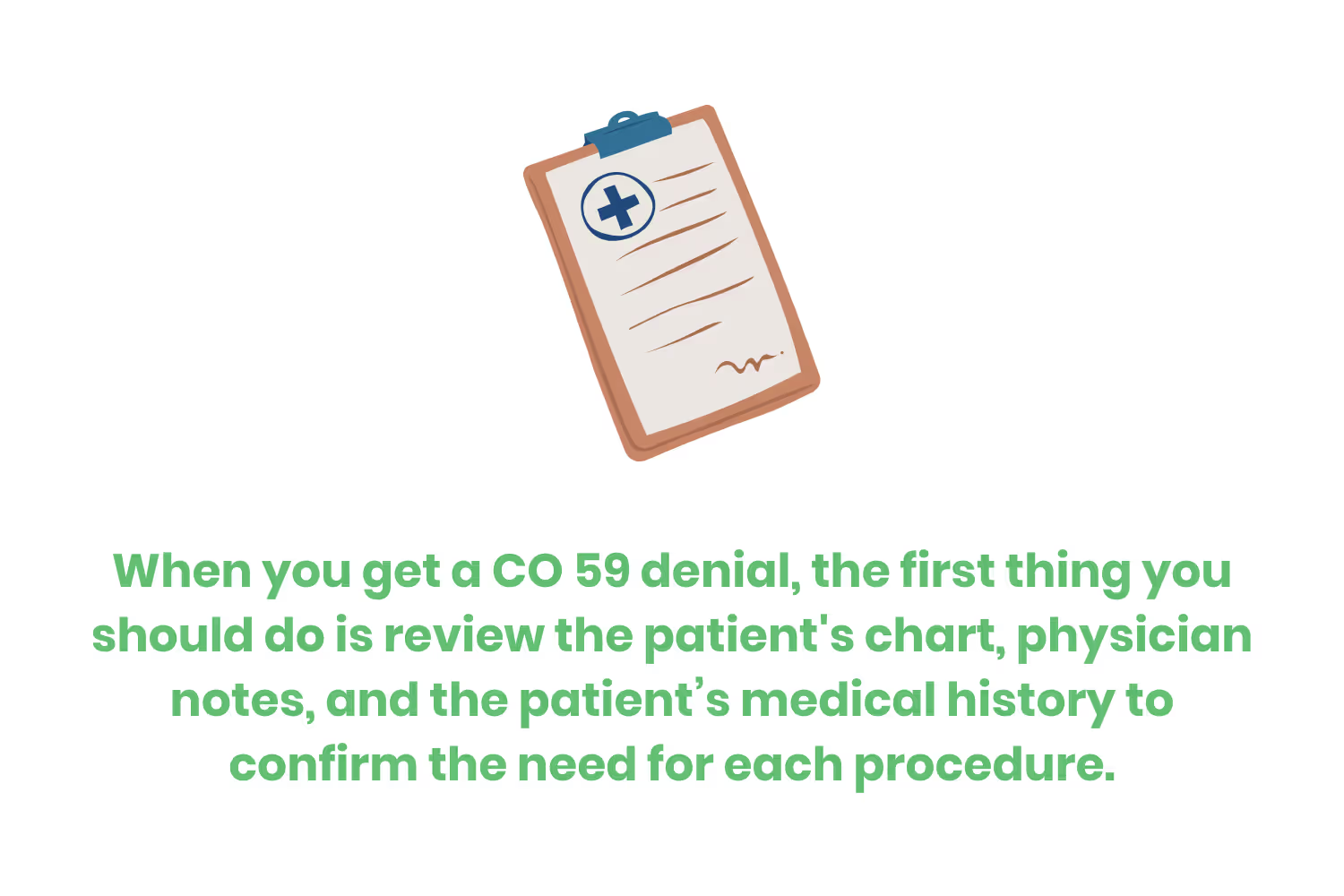
Documentation Gaps
Sometimes the problem isn’t coding but the notes don’t support it, which may result in the claim being rejected. If provider documentation does not clearly show that services were distinct, the payer may assume there is an overlap.
Missing details may include:
- Showing services were done on different body parts.
- Explaining that procedures happened at separate times during the day.
- Providing medical necessity for both services.
Without this evidence, insurers conclude the services should have been bundled and deny payment with CO 59.
Steps to Resolve Denial Code CO 59
Now that you know what the denial code is, how can your team resolve it if you receive it when they receive this denial code?
Check Documentation
When you get the denial, the first thing you should do is review the patient's chart, physician notes, and the patient’s medical history to confirm the need for each procedure. Your team should be confirming that the two procedures or services were distinct in some matter.
Distinct details that the team should be looking for are where and when the procedures performed occurred, and why each procedure was medically necessary. If the documentation supports the claim, the next step is correcting and resubmitting it.
Resubmit with Clarifications
If the claim should not have been bundled and the team filed it correctly the next step is to file an appeal which we detail more later in the blog. If the claim should have been bundled but was incorrectly filed, the team should fix the mistake as soon as possible.
If this is the case, your team should look at the insurance companies policy to see how long you have before resubmitting the new claim. If errors aren’t the issue, missing documentation may be, which leads to the next step.
Collaborate with Providers
There may be some denials that have incomplete notes from the physician or staff members. If there is missing documentation the billing team should request further documentation from the healthcare provider to help get the full picture of the service. This collaboration also helps prevent denials by encouraging clearer notes upfront.
How to Appeal a Claim Denied with CO 59
There are times when the denial code CO 59 is applied incorrectly. If your billing department receives this code in error, here’s how to move forward in the appeals process.
Gathering Evidence
Start by collecting all of the evidence to prove that the claim should have been approved. Focus on patient charts, physician notes, and any other medical records that demonstrate why the services should not have been bundled. Strong evidence increases the chances of a successful appeal.
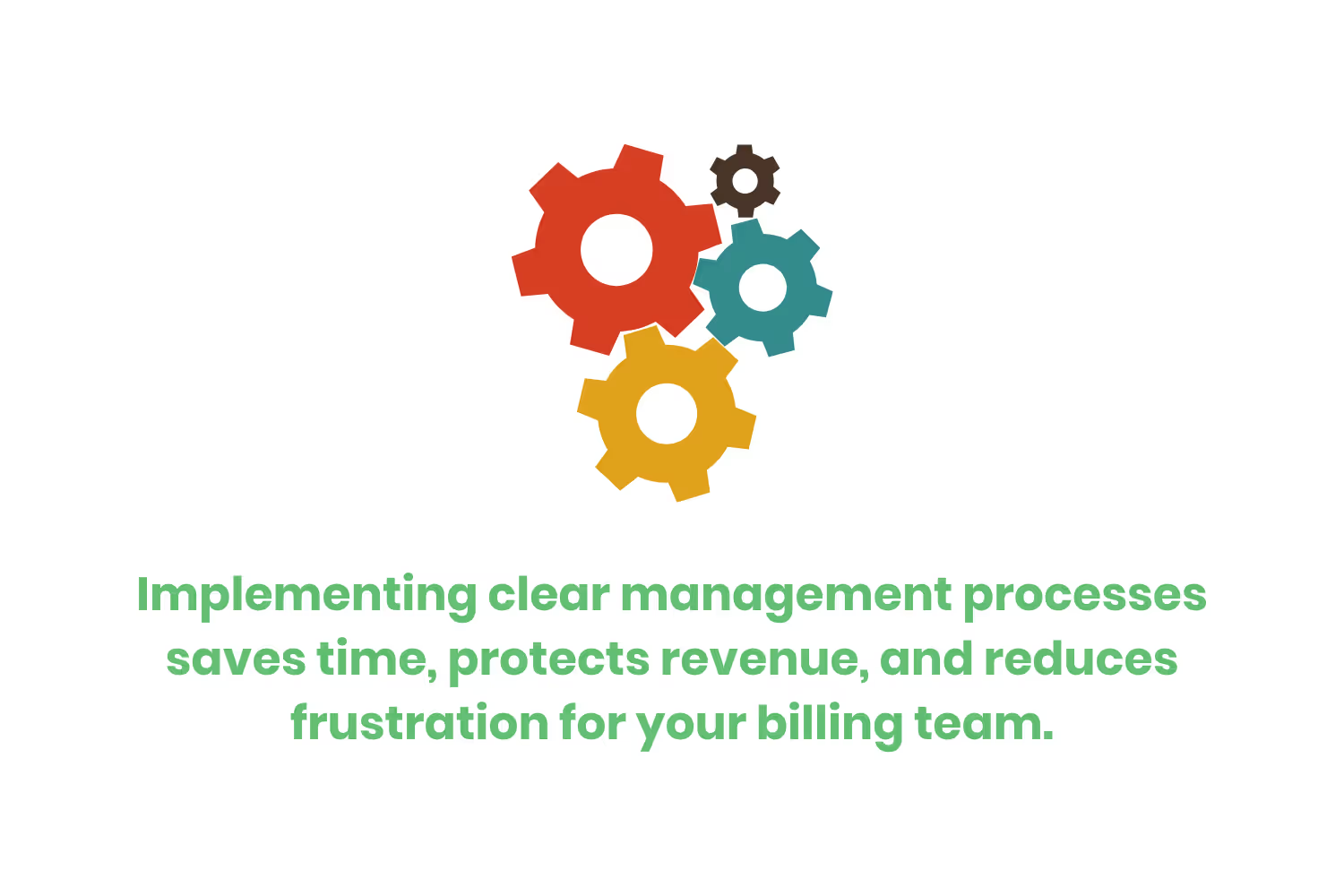
Writing the Appeal
Once documentation is in order, prepare the appeal. Each insurance payer has its own procedures, so it is critical that your team understands the required format and submission process. Clearly explain why the services provided should be paid separately and attach the supporting evidence.
Submit Before Deadlines
Just like how different insurance companies have different filing procedures, they all have different deadlines. Ensuring your team is aware of the deadlines can help ensure appeals are submitted on time. If appeals are submitted late, insurance companies will either ignore the appeal or reject it without reviewing the appeal.
Best Practices to Prevent CO 59
The easiest way to handle CO 59 is to make sure it never happens in the first place.
Implementing clear management processes saves time, protects revenue, and reduces frustration for your billing team. Prevention saves time, protects revenue, and reduces frustration for your billing team.
Here are the three best ways to prevent the denial code CO 59. Another key prevention step is ensuring proper authorization before delivering certain procedures, since missing approvals often lead to denials.
Stay Current on Coding Guidelines
It is important for your organization to stay up to date with rules and payer guidelines, since they change frequently. Having an internal process that requires regular review of updates helps your billing team catch changes before they cause problems. This significantly reduces the chance of receiving denials such as co 59.
Leverage Tools and Training
Billing departments should try to use additional tools, like a clearinghouse or billing software, to review claims before they are submitted. Clearinghouses help catch any errors in the claim before the insurance provider even sees it, which reduces the chance of denials such as CO 59.
Your organization can also take advantage of online training that refreshes employees on important topics or teaches them how to use specific programs. Together, these tools and training help billing staff work more accurately and confidently.
Strengthen Team Communication
The easiest way to prevent denial code CO 59 is by encouraging clear and open team communication. When billing staff feel comfortable asking questions, it takes the guesswork out of filing claims. This helps reduce the overall denials and makes the overall process more accurate and efficient.
Conclusion
Denial code CO 59 can disrupt revenue and workflow, but understanding why claims are denied and following best practices can prevent issues. By checking documentation, collaborating with providers, and maintaining strong management processes, billing teams can improve revenue cycle management and keep healthcare services reimbursed efficiently.
Emphasize your product's unique features or benefits to differentiate it from competitors
In nec dictum adipiscing pharetra enim etiam scelerisque dolor purus ipsum egestas cursus vulputate arcu egestas ut eu sed mollis consectetur mattis pharetra curabitur et maecenas in mattis fames consectetur ipsum quis risus mauris aliquam ornare nisl purus at ipsum nulla accumsan consectetur vestibulum suspendisse aliquam condimentum scelerisque lacinia pellentesque vestibulum condimentum turpis ligula pharetra dictum sapien facilisis sapien at sagittis et cursus congue.
- Pharetra curabitur et maecenas in mattis fames consectetur ipsum quis risus.
- Justo urna nisi auctor consequat consectetur dolor lectus blandit.
- Eget egestas volutpat lacinia vestibulum vitae mattis hendrerit.
- Ornare elit odio tellus orci bibendum dictum id sem congue enim amet diam.
Incorporate statistics or specific numbers to highlight the effectiveness or popularity of your offering
Convallis pellentesque ullamcorper sapien sed tristique fermentum proin amet quam tincidunt feugiat vitae neque quisque odio ut pellentesque ac mauris eget lectus. Pretium arcu turpis lacus sapien sit at eu sapien duis magna nunc nibh nam non ut nibh ultrices ultrices elementum egestas enim nisl sed cursus pellentesque sit dignissim enim euismod sit et convallis sed pelis viverra quam at nisl sit pharetra enim nisl nec vestibulum posuere in volutpat sed blandit neque risus.

Use time-sensitive language to encourage immediate action, such as "Limited Time Offer
Feugiat vitae neque quisque odio ut pellentesque ac mauris eget lectus. Pretium arcu turpis lacus sapien sit at eu sapien duis magna nunc nibh nam non ut nibh ultrices ultrices elementum egestas enim nisl sed cursus pellentesque sit dignissim enim euismod sit et convallis sed pelis viverra quam at nisl sit pharetra enim nisl nec vestibulum posuere in volutpat sed blandit neque risus.
- Pharetra curabitur et maecenas in mattis fames consectetur ipsum quis risus.
- Justo urna nisi auctor consequat consectetur dolor lectus blandit.
- Eget egestas volutpat lacinia vestibulum vitae mattis hendrerit.
- Ornare elit odio tellus orci bibendum dictum id sem congue enim amet diam.
Address customer pain points directly by showing how your product solves their problems
Feugiat vitae neque quisque odio ut pellentesque ac mauris eget lectus. Pretium arcu turpis lacus sapien sit at eu sapien duis magna nunc nibh nam non ut nibh ultrices ultrices elementum egestas enim nisl sed cursus pellentesque sit dignissim enim euismod sit et convallis sed pelis viverra quam at nisl sit pharetra enim nisl nec vestibulum posuere in volutpat sed blandit neque risus.
Vel etiam vel amet aenean eget in habitasse nunc duis tellus sem turpis risus aliquam ac volutpat tellus eu faucibus ullamcorper.
Tailor titles to your ideal customer segment using phrases like "Designed for Busy Professionals
Sed pretium id nibh id sit felis vitae volutpat volutpat adipiscing at sodales neque lectus mi phasellus commodo at elit suspendisse ornare faucibus lectus purus viverra in nec aliquet commodo et sed sed nisi tempor mi pellentesque arcu viverra pretium duis enim vulputate dignissim etiam ultrices vitae neque urna proin nibh diam turpis augue lacus.




